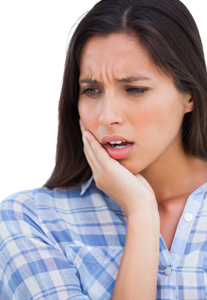Implants: Why It’s Important to Replace Missing Teeth
November 14th, 2018

Sometimes, despite our best care, we lose a tooth. If it is a front tooth, it will probably be a high priority to replace. But if a missing tooth doesn’t show when we smile, what’s the hurry? Let’s look at the reasons why prompt replacement with an implant is always a good idea, no matter which tooth is involved.
Appearance
Implants look like natural, individual teeth, but that is not the only aesthetic reason to replace a lost tooth. Without some type of tooth replacement, missing teeth can eventually affect the structure of our jawbones and change our facial appearance. Cheeks, lips, profiles—all are impacted by the changes in our bones resulting from tooth loss.
Better Bite
Nature abhors a vacuum, and so do our teeth. When a space is left by a missing tooth, the teeth around it might shift positions, affecting the even pattern of our bite. And without a tooth to keep it in place, a tooth above or below the missing one might begin to grow longer to fill the void in your bite. This lengthening, in turn, can cause even more bite problems.
Chewing
With the loss of only a single tooth, there is a negative impact on the remaining teeth. More pressure is placed on the other teeth in order to chew properly, front teeth not meant for chewing might need to be used for that purpose, or food is not chewed as thoroughly as it should be. The first two problems are not healthy for our teeth, and the last one is not healthy for digestion!
Don’t Delay
Changes in bite and chewing problems probably won’t happen overnight, so is putting off the process really a big deal? It can be! Time is not on our side when a tooth is lost. The bone tissue which supports our teeth needs the stimulation of biting and chewing to stay healthy. Without that stimulation, the bone area under the missing tooth gradually shrinks. If there is not enough bone area left, you might need surgical bone grafting to achieve the right bone height to hold an implant, or it could lead to the impossibility of placing an implant at all.
Expense
Replacing a lost tooth quickly requires less restoration of the gums and bone in the future and prevents other serious problems from developing.
We could continue through the alphabet, but instead, come talk to Drs. Sidney and Jacob Kelly about all the reasons a tooth implant might be your best option. Whether you have already lost a tooth, or if you have an extraction scheduled at our Roseville, CA office, we are happy to recommend the best procedure at just the right time to make your smile beautiful, healthy, and complete!



